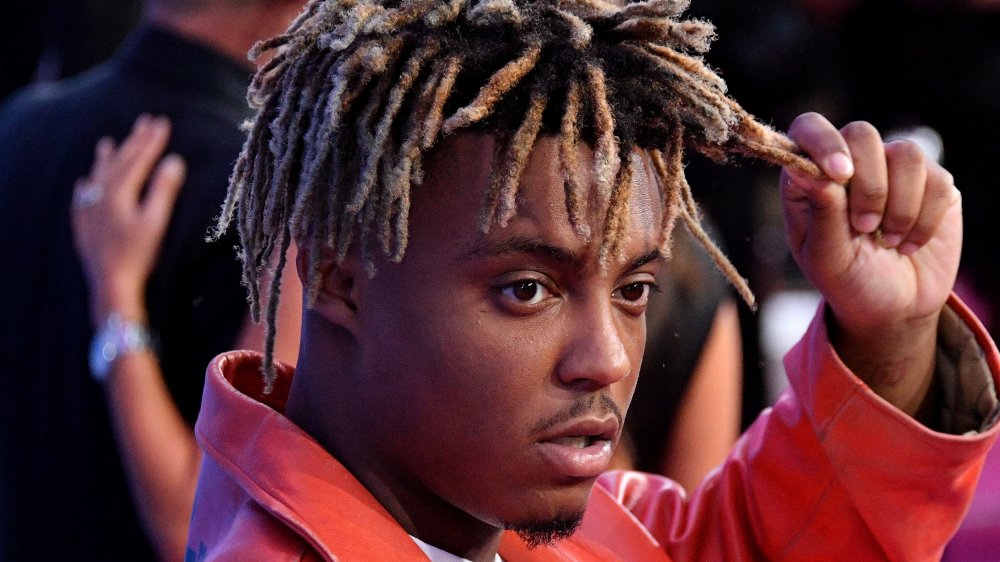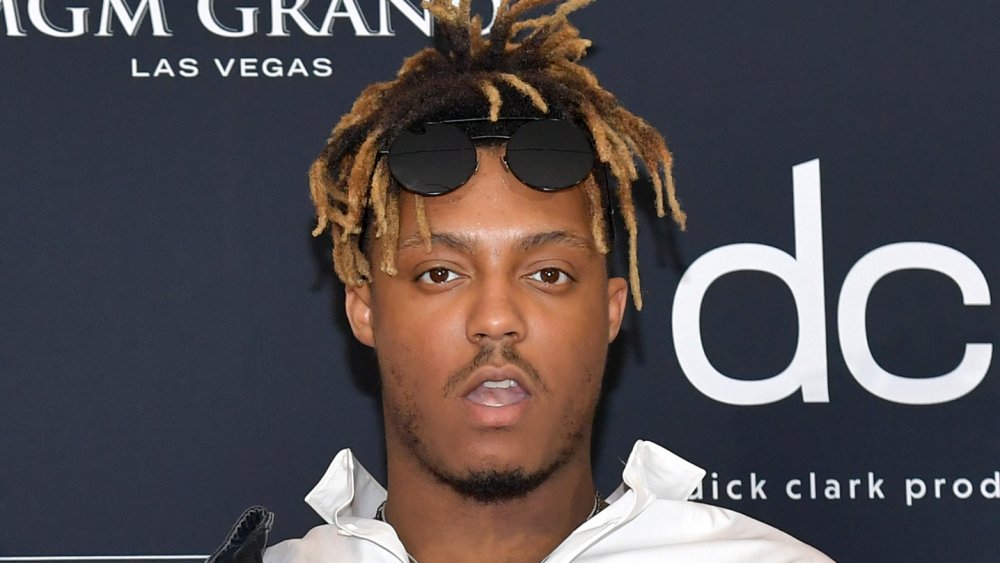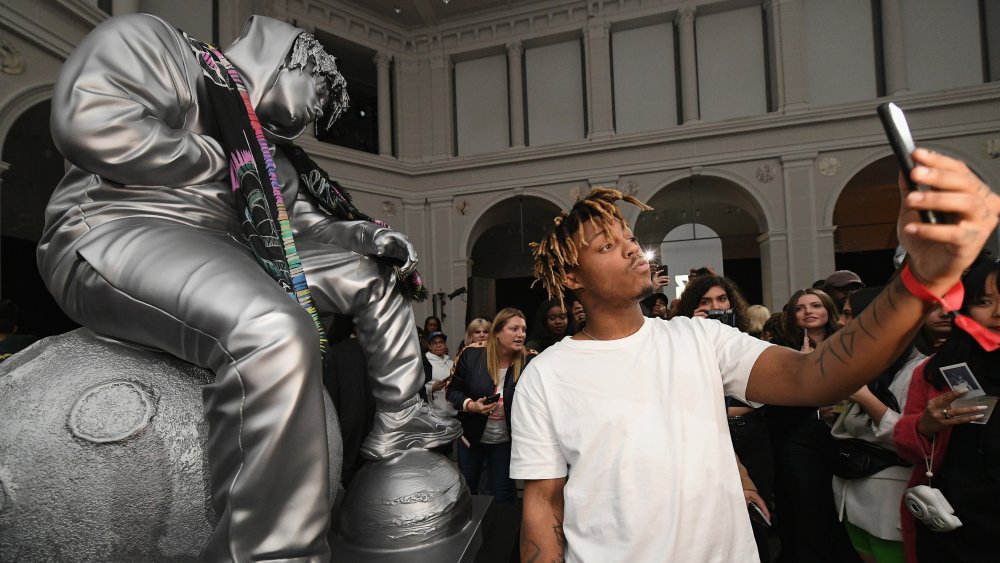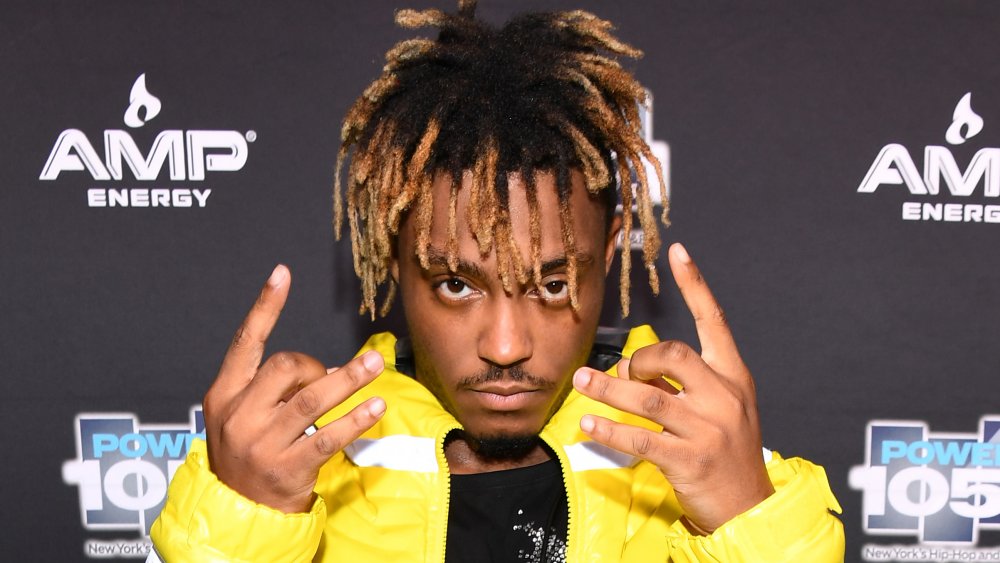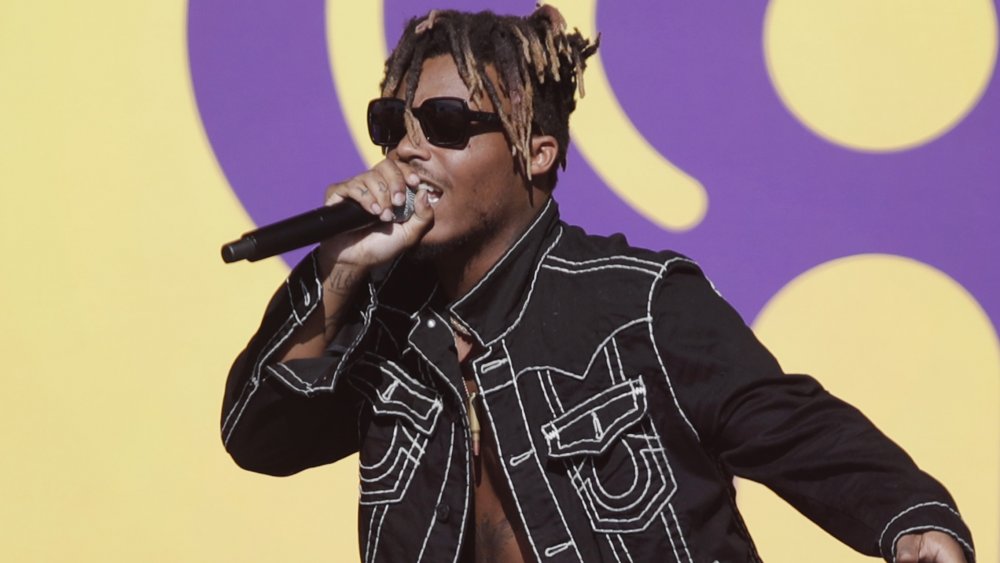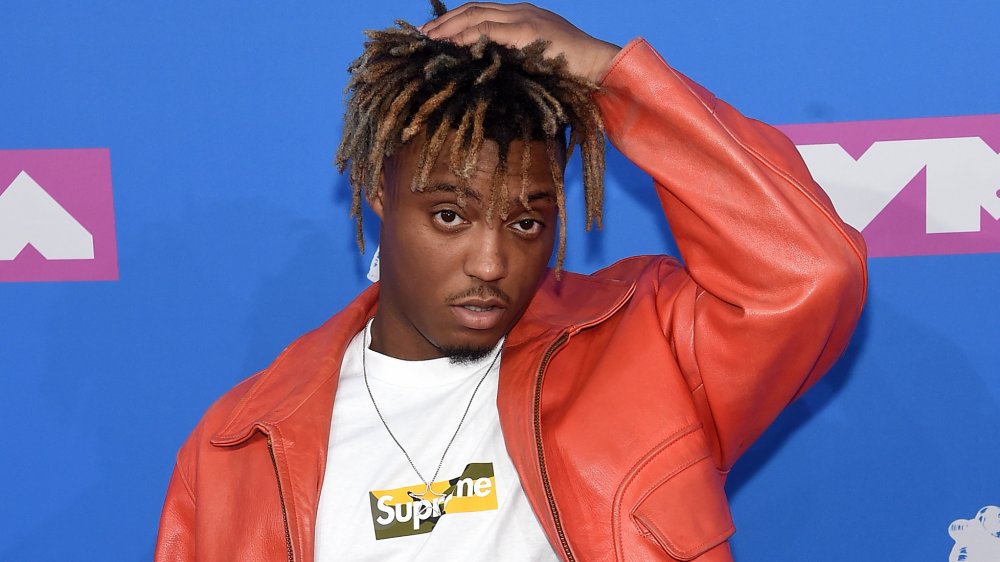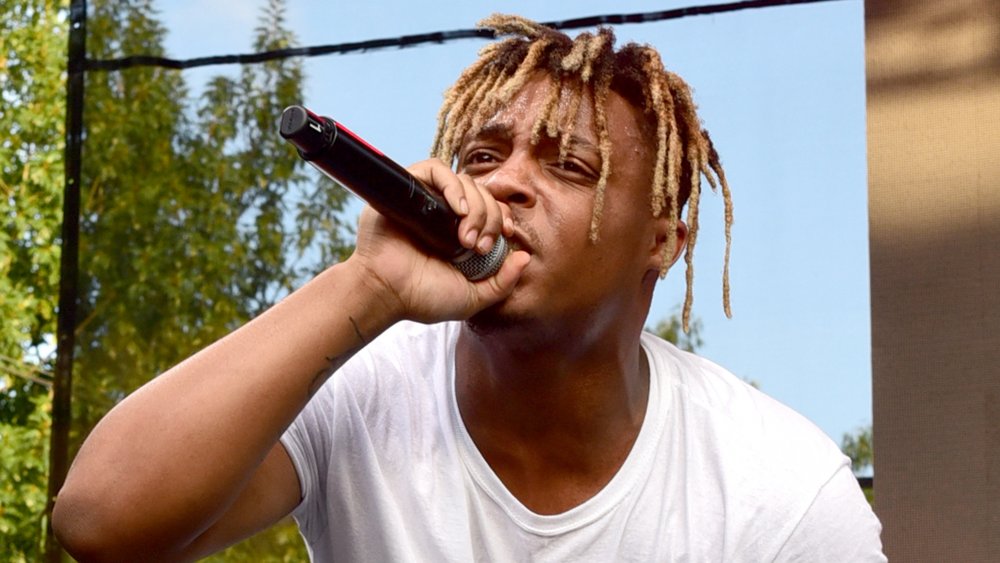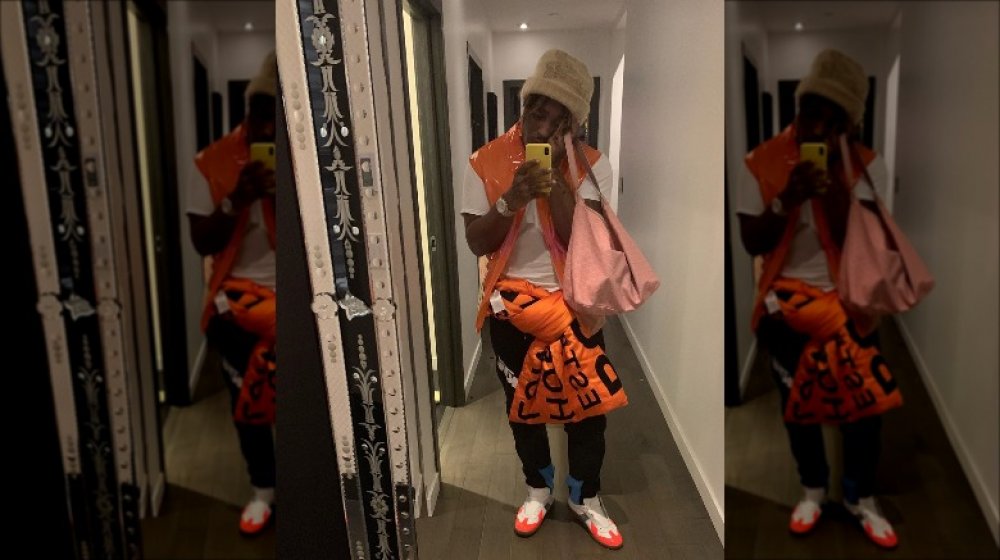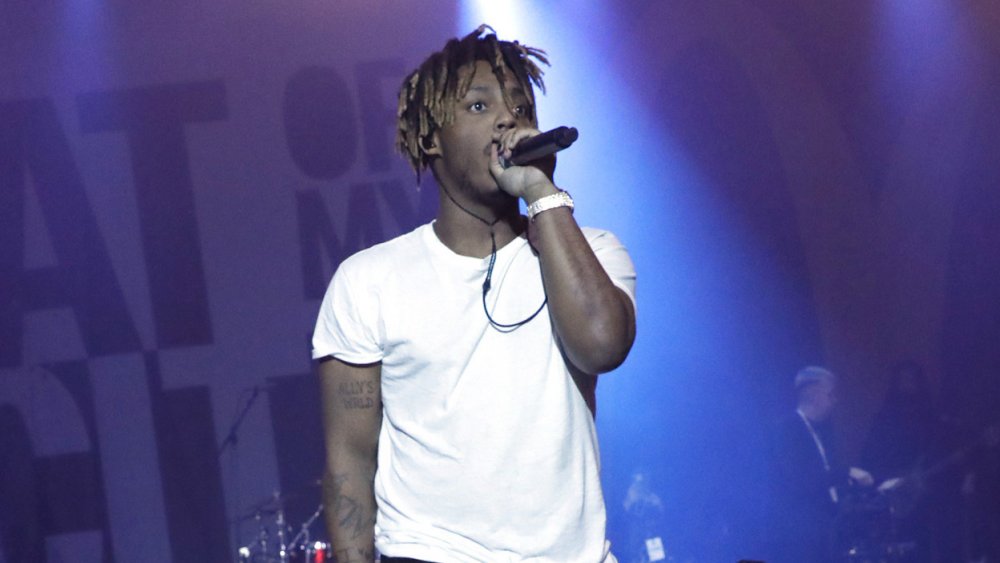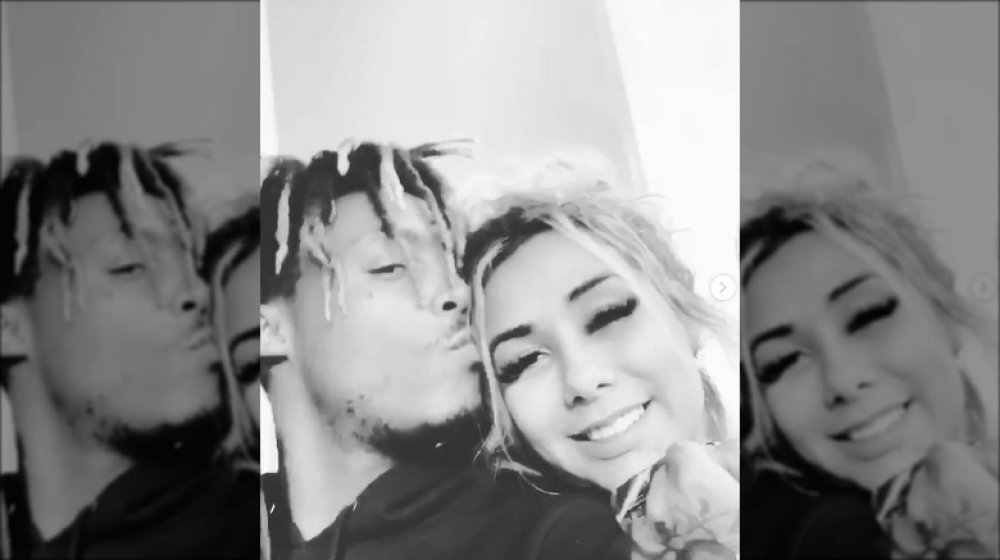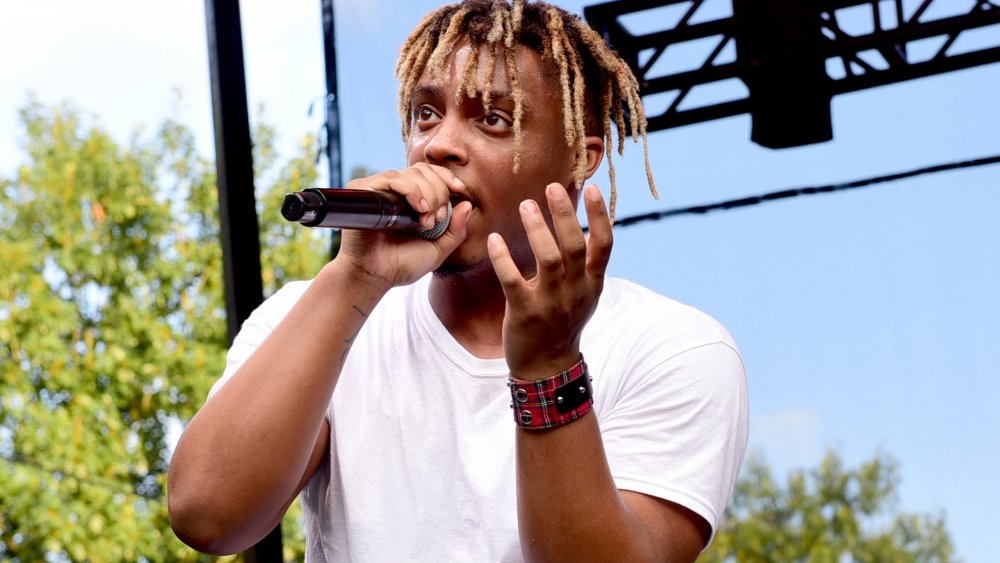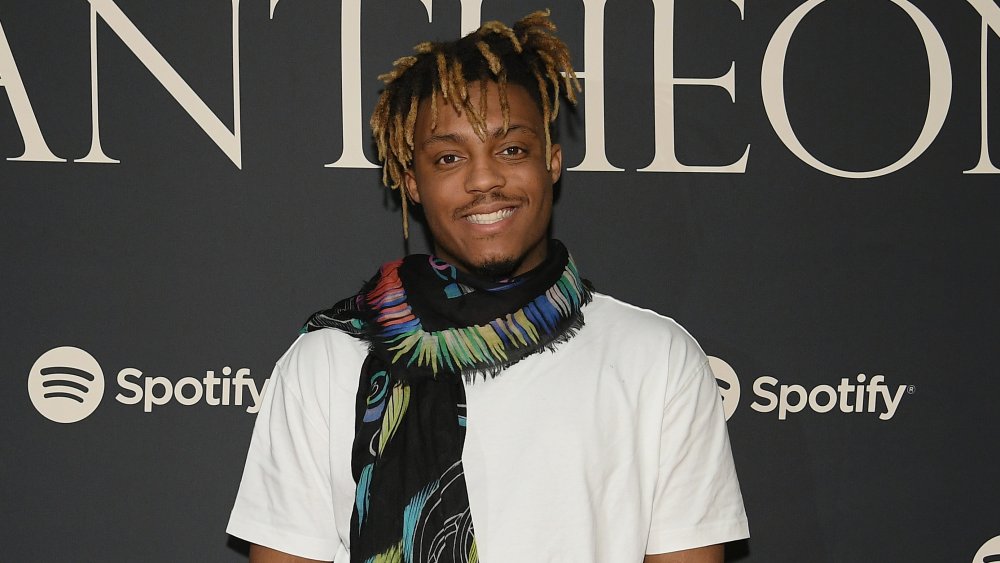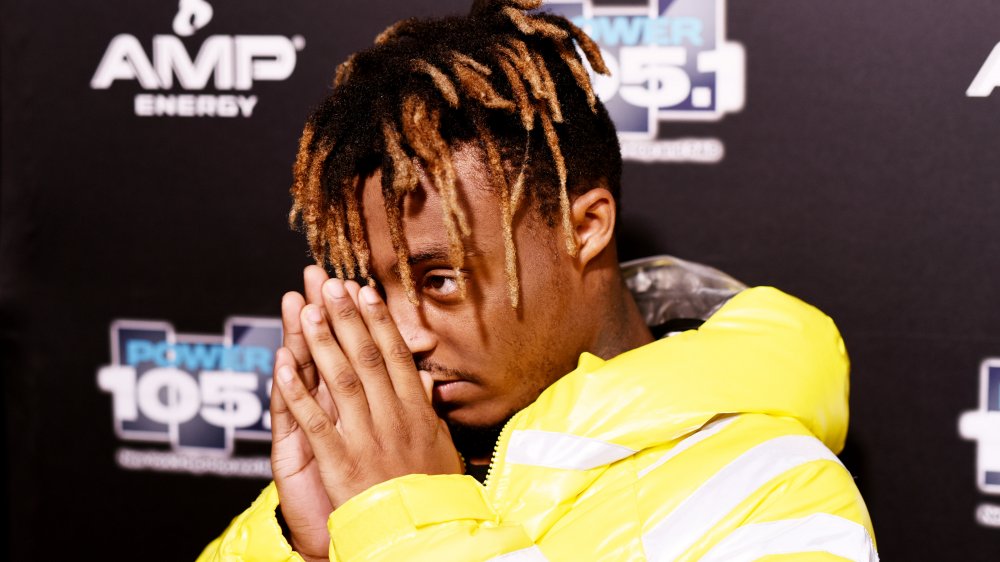The Untold Truth Of Juice Wrld
Just days after celebrating his 21st birthday, SoundCloud rapper Juice Wrld passed away unexpectedly on Dec. 8, 2019. According to TMZ, the music star suffered from a seizure while walking through Chicago's Midway International Airport and was pronounced dead at the hospital not long after.
Juice Wrld, who's real name was Jarad Higgins, only spent a couple of years in the music industry, but his patented brand of emo rap defied genres and traditional masculinity tropes. In an interview with NME, the rapper revealed how he believed expressing emotions was the hallmark of a "real man," saying, "You not running from how you feel? That's what makes you one of the realest people to walk this Earth."
In addition to using his platform to raise mental health awareness, the "Lucid Dreams" rapper received a lot of accolades during his short career. He won the title of artist of the year at the 2019 Billboard Music Awards, and Spotify named him one of the most-streamed artists of that same year, but his beginnings were far more humble. Here's what you didn't know about Juice Wrld.
Juice Wrld briefly worked a day job
It's hard to imagine Juice Wrld as anything other than a rapper, but toward the end of the SoundCloud star's teen years, he briefly held down a day job, biding his time until he made it big.
His journey toward music started when taught himself how to play the keyboard with the help of YouTube tutorials, according to The New York Times (though Juice Wrld's AllMusic biography state he also played drums and guitar — a true multi-instrumentalist). As a high school sophomore, the rapper began uploading songs to SoundCloud. According to XXL magazine, he picked up a job at a "factory that made car parts" while he tried to build his SoundCloud presence — but college wasn't really an option for this rapper. In an interview with Vulture, the singer-songwriter revealed, "I never thought about college, but my mom thought about it for me. I knew 100 percent it wasn't for me. I would've been going for all the wrong reasons. I'd go, but it would have to be for something I'm passionate about."
Thankfully, Juice Wrld never had to make the choice between grinding at a meager day job or getting a degree. He was discovered at the ripe age of 18, the same age most people head out for their freshman year of college.
He didn't plan any aspect of his success
Juice Wrld's success wasn't meticulously planned out. In fact, it wasn't even planned out at all. According to Complex, the rapper freestyled virtually everything — including his hits, "Lucid Dreams" and "All Girls Are the Same" — which translated into the way the musician ran his business.
The singer started completely DIY. The New York Times reports that Juice Wrld was around 15 years old when he started recording songs with his cellphone and putting them online as Juice The Kidd. At the age of 18, he was discovered by Lil Bibby and G Money, who signed him to Grade A productions, according to XXL magazine. Then, in 2018, he finally got his major label shot. According to Billboard, Juice Wrld signed a deal worth more than $3 million with Interscope — but again, the success was still kind of random.
In an interview with Complex, Juice Wrld admitted that he didn't have any strategy when it came to releasing music, noting that the attention just came on its own within six to eight months of uploading his music to SoundCloud. "I would text my producer, 'Should I drop this?' And he would say yes, and I would drop it. Nothing, like, preplanned," he said. "There was no, 'I'm going to drop a project here.' I just went off gut instinct." That gut instinct clearly paid off, considering "Lucid Dreams" was already certified six times platinum just before Juice Wrld's passing.
Juice Wrld wasn't allowed to listen to rap as a kid
When Juice Wrld was a kid, he wouldn't have been allowed to listen to his own music. In an interview with Complex, the rap star revealed that his mother was a "real conservative, on some hardcore Christian-a** s**t," and wouldn't let him listen to the genre in fear that he'd "grow up like the other motherf**kers" around him. Instead, Juice Wrld's mom preferred Gospel music, and the singer was only introduced to the world of rap through his cousins. As it turns out, the songs he snuck behind his mama's back were exactly what taught him how to rap.
"I remember my cousins let me listen to old Gucci, old Wayne, old Birdman," Juice Wrld told the media outlet, adding, "I'd be trying to listen to Gucci and Jeezy and s**t and I couldn't remember the lyrics, so I would just finish them myself, and that's how it would start." That said, the rapper went on to tell Complex that his mom had since opened up to the idea of him being a professional rapper. Who's mama doesn't want their son to be a platinum-selling music star?
This rapper wrote 'Lucid Dreams' in 20 minutes
Most modern pop songs have a team of writers who work for days, weeks, or sometimes even months to perfect the track. Just look at Zedd's "The Middle" featuring Maren Morris. According to The New York Times, it took more than a year to make the version of the song we heard on the Top 40 charts. For comparison, Juice Wrld wrote his hit 2018 single, "Lucid Dreams," in about the same amount of time it takes to shower before work.
In an interview with Billboard Juice Wrld revealed that he was a senior in high school when he sat down on the couch in his living room and came up with the chorus and verses of the song. It only took him about 20 minutes to lay it down once he got to the studio, and that 20 minutes changed his entire life. But by 2019, the song became so famous that rapper was absolutely sick of it. In an interview with NME, he admitted he hated it "with a passion," saying, "It's getting tired to me. I still play it, but I'm glad I dropped the album."
Fans seem to disagree. According to Forbes, the track had more than 980 million streams on Spotify at the time of this writing.
Juice Wrld lost 85% of the money from 'Lucid Dreams,' but didn't care
"Lucid Dreams" might have made Juice Wrld famous, but it didn't make him a lot of money. It did, however, make Sting a lot of money. Speaking to Billboard, the English artist joked that royalties from the song were going to put his grandkids through college. How? In case you weren't following music Twitter closely in 2018, Juice Wrld's track samples Sting's 1993 single, "Shape of My Heart," and as a result, Sting was a credited writer who got 85% of the royalties — at least if we're going by an angry, since-deleted tweet from the song's producer, Nick Mira.
For his part, Juice Wrld told NME that the real number was actually higher. Either way, he wasn't sweating it. "That song is so much more expensive than money and what money can buy. It's so much more touching than what money could touch. That song really saved lives. And people are sitting here telling me, 'Blah blah blah, 90% this, 90% that,'" he said. "They bogus f**ks. No, bro. Without Sting, this wouldn't even be a song. I don't really trip on money, especially with a song like that, with the reaction it's had from everybody."
Following Juice Wrld's death, Sting told CNN that "Lucid Dreams" was his "favorite of all the many interpolations of 'Shape of my Heart,' it will resonate for many years to come."
'Lucid Dreams' was still battling lawsuits at the time of his death
Sting wasn't the only artist to ask for royalties from "Lucid Dreams." Juice Wrld was also sued by the now-defunct pop-punk band Yellowcard, which rose to prominence in the early aughts with the mega-hit "Ocean Avenue."
According to reports from The Blast and Billboard, the 2019 suit claimed Juice Wrld copied "melodic elements" from the band's 2006 song "Holly Wood Died," and referenced how he'd publicly repped emo pop-rock bands and became a fan of the genre in fifth grade (he mentioned this to GQ in 2019). According to the suit, the rapper would have been a fifth grader the year "Holly Wood Dead" was released and the year after Fall Out Boy dropped From Under the Cork Tree, which shared a producer with Yellowcard's album and happened to be one of Juice Wrld's favorites. The band was seeking $15 million in damages and a royalty or ownership share of the track.
The validity of the claim has since been highly debated in pop punk message boards and YouTube comments sections across the Internet, but if you ask us, there is some resemblance there. Is it enough for the band to win? Was it even on purpose? What happens now that Juice Wrld has died? Katy Perry and her team might have set the precedent earlier that same year when they had to cough up around $2.8 million for copyright infringement, but only time will tell.
Juice Wrld was an emo kid at heart
Anyone who's listened to Juice Wrld's lyrics knows the rapper was an emo kid at heart. He might have grown up secretly listening to rap behind his mother's back, but he also had a penchant for a good pop-punk song.
Per The New York Times, he discovered emo and punk music the same way emo kids of the early aughts found their favorite bands: by playing 2001's Tony Hawk's Pro Skater 3. Juice Wrld happened to be a fan of early '00s game consoles, and though the game wasn't enough to make him run off and join the Black Parade, he did tell GQ in May 2019 that the one person he wanted to work with next was Buddy Nielsen, the lead singer of Senses Fail (this came from the same guy who'd also messaged A-listers like Pharrell).
Yup, Juice Wrld's emo roots went pretty deep. GQ reported that he started playing Tony Hawk's Downhill Jam during middle school (what was it with those Tony Hawk games?), which introduced him to bands like Weezer and Green Day. He also started listening to Black Veil Brides because his fifth grade crush liked that kind of music, and sang along to "Dear Maria, Count Me In" by the pop-punk band All Time Low during this interview. In addition, MTV News noted his preference for Fall Out Boy's 2005 album From Under the Cork Tree. Once an emo kid, always an emo kid.
He struggled with substance abuse
Juice Wrld sadly struggled with substance abuse since he was a kid. According to XXL magazine, he started sipping lean — or codeine cough syrup — when he began listening to Future in the sixth grade. The New York Times reports that he graduated to Xanax in high school, and during an interview with NME, the star admitted he was drinking "lister-lean," a mix of Sprite and Listerine.
Per a 2018 interview in Vulture, Juice Wrld was trying to separate himself from a life of drug use, which isn't an easy feat if you're already in the throes of an addiction. The following year, he was still considering "undergoing a detox in Los Angeles," according to the The New York Times. After a drug scare in July 2019, he took to Twitter to announce that he was quitting Codeine, but it's unclear if he was able to kick the habit for good. "Every now and then I have concerns," the rapper told The New York Times of his drug use. "But at the end of the day, I'll be fine. I was put on this earth for a reason."
According to the Chicago Tribune, police were reportedly searching Juice Wrld's luggage at the time of his fatal seizure, and uncovered 41 vacuum-sealed bags of cannabis, six bottles of prescription codeine cough syrup, and firearms and ammunition. The rapper's girlfriend reportedly later told authorities that Juice Wrld "has a drug problem" and had been taking Percocet.
Juice Wrld's relationship was a total whirlwind
Juice Wrld was young, but he knew love when he felt it. His relationship with Ally Lotti was an absolute whirlwind, and she remained by his side pretty much from the moment they first met to his very last day on this planet. According to his 2019 GQ profile, the rapper met the social media influencer when she slid into his Instagram DMs as a fan.
"A few months later, while on tour, he drives to Providence, Rhode Island to meet Lotti for the first time," the magazine writes. "It's raining, because of course it's raining, and on the drive to her hotel Juice puts on Imogen Heap's 'A New Kind of Love' and lets the butterflies flutter around in his stomach. They meet. It goes well, he thinks." Juice Wrld and Lotti's first date ended up lasting four days. Shortly after, she moved out of her Memphis home to be with the rapper in Los Angeles. She had to have everything shipped to her, including her two dogs, but she never once looked back.
However, Juice Wrld's friends were a little less stoked about their pal's budding relationship. "All my homies be like: 'What you doing with a girlfriend? You got all this stuff going on,'" Juice Wrld told the The New York Times. "I love her, though. I can admit and say that I have feelings."
This rapper was one of the most-streamed artists of 2019
In just a couple of years, Juice Wrld made a massive impact to the music industry. According to Billboard, the star made 25 appearances on the Billboard Hot 100 in less than two years. That's absolutely unbelievable considering he got his start singing into his cellphone.
Both "All Girls Are the Same" and "Lucid Dreams" debuted toward the bottom of the Hot 100 in 2018, but "Lucid Dreams" quickly started climbing into the Top 40. Since then, Juice Wrld's top tracks have included "Fine China," which featured Future and peaked at No. 26; "Bandit," which featured YoungBoy Never Broke Again and hit No. 10; and "Lucid Dreams," which skyrocketed to No. 2 and spent a month in the Top 10. Juice Wrld ended up topping Billboard's Artist Hot 100 Chart in early 2019.
Beyond his success on the Billboard charts, Juice Wrld was also named Spotify's No. 4 most-streamed male artist of 2019 in the United States. Following his death, "Lucid Dreams" shot to No. 1 on Apple's Top 100: USA chart and Spotify's United States Top 200 chart, according to Fox News. The song was also expected to surpass 1 billion streams by mid-December 2019.
Juice Wrld's life's mission was to help people
Juice Wrld never rapped for the money. His goal was always to help people get through the same tough stuff that he experienced throughout his life — this included drug addiction, depression, and heartbreak. In fact, he told NME that he purposely rapped about the dark side of drugs to shed light on that sort of lifestyle, claiming most rappers only mention "getting high and feeling great."
Judging from an interview with Vulture, Juice Wrld went above and beyond to help his fans throughout his short lifetime. Though he was often playing stadiums towards the end of his career, he revealed that he liked smaller shows because he could have conversations with fans and "talk through whatever demons they're fighting." He also told NME that he made music to help others, and it seems like it was working, considering people reportedly told him that he saved lives all the time. It's clear the rapper felt a strong responsibility and didn't plan on stopping.
"I ain't finna stop the mission that I've been put on. I'm gonna still lead people through whatever they're going through," he told Vulture. "And since I've gone through it. I could forever speak on it, no matter how I feel. I could be happy and make a song for people that's dealing with depression. I could be sad and make a song that will make people smile and be joyful."
Juice Wrld's 'Legends' remains an eerie prediction of his death
Juice Wrld's tragic passing shocked more than just the rap world. The singer managed to completely defy genres, landing collaborations with Panic! at the Disco's Brendon Urie and singer Ellie Goulding. In many ways, he pushed SoundCloud's wave of emo rap into the mainstream, but still suffered the same fate as some of his fellow Internet rap pioneers. Fans have noticed that the gutting track, "Legends," from Too Soon may have eerily predicted the rapper's own death.
The 2018 EP was originally meant to be a tribute to late rappers Lil' Peep and XXXTentacion. According to TMZ, the former passed away from an overdose of fentanyl and generic Xanax at the age of 21. The latter was murdered at age 20 as he was leaving a motorcycle dealership in South Florida. Ultimately, "Legends" saw Juice Wrld question his own mortality. "What's the 27 Club? / We ain't making it past 21," he sang on the track. "I been going through paranoia / So I always gotta keep a gun / Damn, that's the world we live in now / Yeah, hold on, just hear me out / They tell me I'mma be a legend / I don't want that title now / 'Cause all the legends seem to die out."
Like Peep and XXXTentacion, Juice Wrld tragically didn't make it past 21. Following his untimely death, The New York Times announced the end of the SoundCloud rap era.

